Tick tock goes the Brexit clock! With less than a month to go, here’s an update on the Brexit developments in Westminster and beyond.
Tick tock goes the Brexit clock! With less than a month to go, here’s an update on the Brexit developments in Westminster and beyond.
February 28 2019
Brexit Countdown: 29 days to go...
Summary:
This was supposed to be an important week in Westminster. By now, there should have been a vote on the Withdrawal Agreement and key amendments. True to form, none of these events have taken place. The next ‘meaningful vote’ is now scheduled for 12 March (though there do appear to be rumours this could occur earlier). The amendments that ended up being put up for vote on 27 February were of no real consequence. There are, however, two interesting developments. Firstly, Labour has now officially come out in support of a second referendum (although with Labour leader Jeremy Corbyn still being vocal about this being a bad idea, it appears he has been dragged kicking and screaming to this position). Secondly, UK Prime Minister Theresa May has, for the first time, acknowledged the possibility of a delay to Brexit. An amendment had been tabled for voting – that would have forced May to apply for an extension if the Withdrawal Agreement – was defeated. On 26 February, May committed to the House that should the Withdrawal Agreement be defeated, she would allow a vote the next day on whether Parliament wants to leave the EU without a deal and (if the answer to that is a no) a vote the next day on whether Parliament wants a ‘short’ extension to Brexit. Whilst this appears to have satisfied enough MPs for the amendment to have been withdrawn, there is one key difference between this proposal and the amendment. The amendment would be an either/or scenario – i.e. either the deal is accepted or an extension is applied for. May’s solution is open-ended – there is no clarity on what happens if the deal is rejected, if Parliament votes against leaving without a deal and if it votes against an extension (or the EU denies the extension). Could this process be setting the UK on the path to an accidental no-deal Brexit? (see Westminster section).In general, businesses appear to remain concerned about the uncertainty – many feel a short delay simply pushes the ‘cliff-edge’ slightly forward rather than solving any problems (see Beyond Westminster Section). The US and UK has agreed a deal on derivatives that will replicate the deal between the EU and the UK to assure market continuity. The EU is also looking to strengthen the rules on equivalency to deal with the unprecedented scenario of having a large non-EU financial market right on its doorstep (see Asset Management Section).
The quote of the week comes from Steve Eisman (Neuberger Berman Group money manager, whose bets against the housing market in 2008 were the subject of Michael Lewis’s The Big Short), discussing his bets against UK banks and staying away from the rest of the British market:
"Nobody has a freaking clue … I suspect we will be talking about Brexit at least through the summer."
Westminster:
Latest Implied Odds From Betting Markets:
The two developments discussed in the summary above have caused some movement in the implied odds for all three events. The odds of a second referendum have increased, and the odds for both a no-deal Brexit and the UK leaving the EU on 29 March have both decreased.
Figure 1. Implied Probabilities of Brexit Outcomes
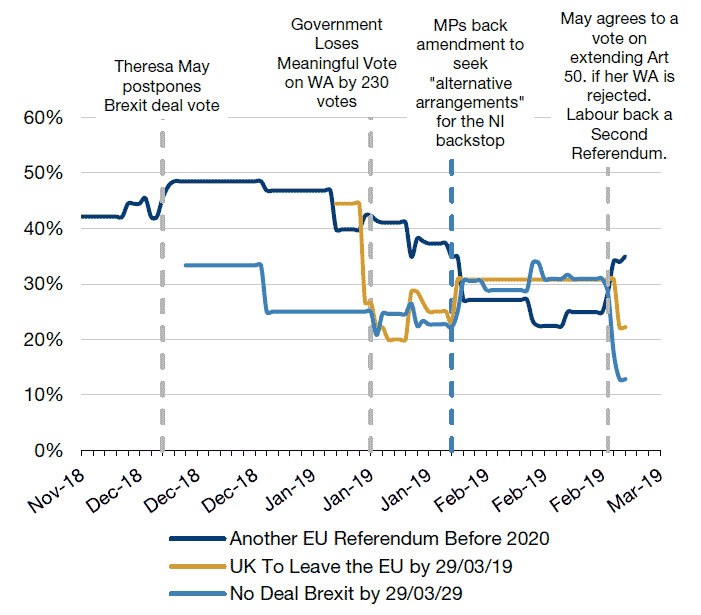
Source: Man FRM; as of 28 February. Man FRM calculates the implied probabilities of Brexit outcomes using prevailing odds as priced by UK bookmakers, which are collated on a daily basis. The graph presents the implied probabilities of Brexit outcomes averaged across all UK bookmakers for which data is available, over time. This data analysis is based upon information obtained from third party sources not affiliated with Man FRM. Man FRM cannot guarantee the accuracy of this data and it should not be relied upon by investors.
What Happened Recently?
Meaningful Votes and Amendments:
- May has once again delayed the ‘meaningful vote’ on the Withdrawal Agreement, which had been slated to be completed on 26 February; this is despite rumours the week before indicating that a vote could be held early in the week commencing 25 February.
- May committed on 26 February to holding the next vote on her deal on 12 March. She also made some further commitments in an effort to stem resignations from the party. These new commitments are: in the event her deal is rejected, there will be a vote on 13 March on whether or not parliament wants to leave the EU without a deal. If the ‘no’ votes win this one, then there will be a further vote on 14 March as to whether the UK parliament wants to apply for a ‘short’ extension to the Article 50 process. This announcement does seem to have taken the wind out of the sails of an amendment tabled that asked for similar measures. However, there is one crucial difference. The amendment would require May to seek an extension should her deal be defeated; May’s commitments are silent on what would happen should the UK parliament say they do not want a no-deal but also do not want an extension.
Figure 2. What Next?
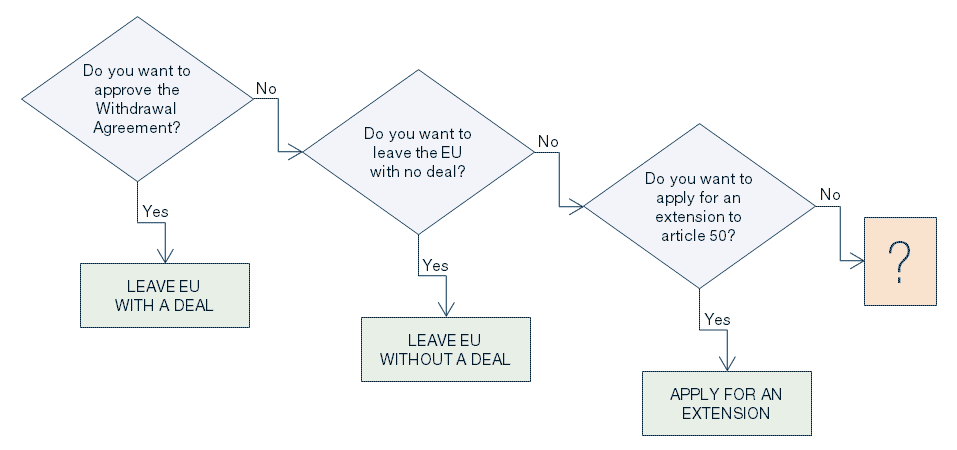
Source: Man FRM, for illustrative purposes only.
- Five Amendments were selected by the Speaker of the House of Commons for debate and voting on 27 February. Two of these were not put forward for a vote following UK government assurances. Of the remaining four amendments, one was passed and the remainder were defeated:
- Labour MP Yvette Cooper – PASSED – For 502, Against 20: What was interesting about this amendment is given it was just a re-affirmation of May’s pledges the day before to allow votes on a no-deal Brexit and delays, it was not expected to be voted on. The European Research Group (‘ERG’) and other Conservative rebels forced the vote, which was largely a symbolic protest. However, a third of Conservative MPs rebelled against the motion. More than 80 Conservative MPs abstained from the vote and 20 voted against it. This was in addition to nine DUP Members of Parliament (‘MPs’) and 11 Labour MPs also abstaining. This could be seen as indicative of the fight within the Conservative party as to whether or not no-deal should remain on the table.
- Labours Amendment – DEFEATED – For 240, Against 323: This essentially was an amendment to replace the UK government’s current Brexit plan with Labour’s plan. This would include a permanent customs union, close alignment with the single market and dynamic alignment on rights and protections. All media commentators expected this amendment to be defeated.
- SNP & Plaid Cymru Amendment – DEFEATED – For 288, Against 324: This would get the government to rule out the option of leaving the EU without a deal on any date i.e. regardless of whether there is an extension or not.
- Conservative MP Caroline Spelman – Not voted on: States that MPs should have the opportunity to debate and vote on extending Article 50 on 28 February.
- Conservative MP Albert Costa – Not voted on: Would require the UK PM to ensure that the safeguards on the rights of the EU citizens that were agreed as part of the Withdrawal Agreement would apply even if the UK leaves the EU without a deal.
Second Referendum:
- A large group of Labour MPs came out in favour of supporting May’s deal, provided it gets put to a people’s vote – a policy which Corbyn had not come out in support of. There were threats that if Corbyn did not support this, this group may resign from the party and join the new Independent Group in parliament. A YouGov poll for the The Times on 23 February indicated that The Independent Group was polling at 18% – only 5 percentage points behind Labour at 23%. Interestingly, when combined with the Liberal Democrats, who also support a second referendum, this equates to 24% – 1 percentage point above Labour in the poll.
Figure 3. Westminster Voting Intention (Including the Independent Group)
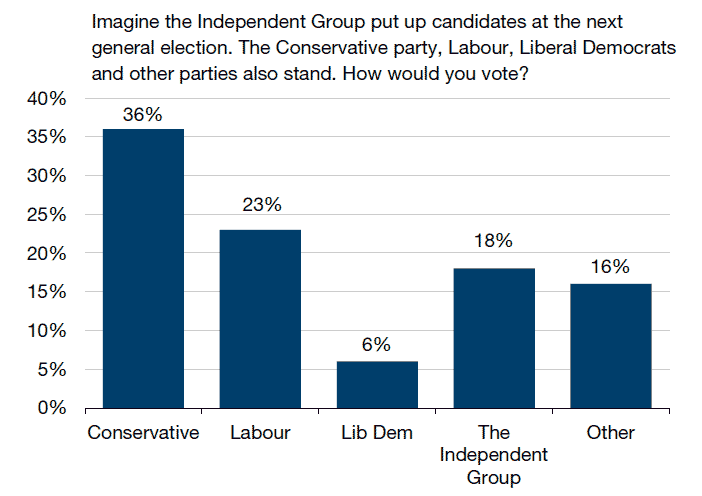
Source: YouGov; 22-23 February 2019.
- Labour has now explicitly come out in support of a second referendum following on from the defeat of its Brexit plan in the voting on amendments on 27 February. Despite the pledge that Labour will support this, Corbyn continues to opine publically that a second referendum is not a good idea and would be divisive for the country. He is also promising to continue to push other options, such as Labour’s Brexit plan or a general election. In previous votes, Corbyn has turned a blind eye to rebel MPs voting against the party. It is not unlikely that the same would be done for any Labour MPs who do not back the referendum.
Delayed Brexit:
- May, until 25 February, had continued to insist that it is feasible for the UK to leave the EU on 29 March. This was by no means a Conservative party-wide feeling, with up to 25 members of the UK government – including four cabinet ministers – indicating that they will vote for a delay to Brexit. It now seems likely that May will offer a vote on the deal on 12 March. If the deal is rejected, this will be followed by a vote on whether to go ahead with a no-deal Brexit on 29 March or to opt for a ‘short extension’.
- The EU has expressed a preference to delay Brexit until 2021. This suggests that it may not be willing to grant a short extension that appears to be preferable to pro-Brexit MPs. EU Council President Donald Tusk has also said that an extension would be a “rational solution” if a deal is not ratified soon. Chief EU negotiator Michael Barnier has indicated that he believes the risk of an “accidental” no-deal Brexit – i.e. the UK just runs out of time – is increasing.
- French President Emmanuel Macron on 27 February warned that France will block any delay unless it was the result of a “new choice of the British,” indicating that a postponement of a no-deal deadline would not be a reason to extend. Other EU leaders have offered more compromising comments. As a reminder, all 27 heads of states of EU members would need to agree to any extension.
What Happens Next?
- The next ‘meaningful vote’ is now scheduled for 12 March (and will be followed by two days of voting on no-deal and an extension as described above). There are rumours quoted in the media that this vote could be as early as next week.
- So, could May win a vote for her deal? The numbers would be tight, but analysis for The Times by financial consultancy firm Cicero suggests it is still possible even if she loses the support of more than 30 of her MPs. May would need to secure enough changes to the agreement to secure the support of the DUP and 25 Labour rebels. If – and this is a big if – this occurs, then she would only need to convince approximately half of the rebel Conservative MPs (who either abstained or voted against the government’s neutral motion on 14 February).
- With Labour now officially supporting a second referendum, they will table an Amendment to the ‘meaningful vote’. It is expected that this will be selected to be voted on.
- Would there be numbers in parliament for a second referendum? All of the opposition parties support it and various media outlets estimate there are around 12 Conservative or Independent MPs who would support this. There are also approximately 30 Labour MPs that would rebel. Taking into account that the seven Sinn Féin MPs do not take their seats in Westminster and the speaker does not vote, Labour would be around 43 MPs short on getting this passed. The difference would need to be made up from Conservative MPs (and a few independents), which is far from certain to happen.
Preparations for a No-Deal Brexit:
- The UK government on 26 February published a previously confidential report on the economic impact of a no-deal Brexit. It included warnings that businesses were under-prepared and food prices might rise. The report also noted that a third of the critical UK government projects for a no-deal Brexit would not be completed by 29 March. It noted that only 40,000 out of an estimated 240,000 companies had applied for the new identifier that would be required to trade with the EU in the event of a no-deal Brexit.
- Japanese Trade Minister Hiroshige Seko has said that Japan’s economic partnership agreement with the EU will not apply to the UK in the event of a no-deal Brexit. Trade between Japan and the UK would return to basic WTO rules. The UK government has confirmed that trade deals with Japan (and Turkey) will not be rolled over by 29 March.
- The CEO of Go-Ahead (a company that runs some of the biggest rail and bus networks in Britain) has said that there is a risk that some passenger services will have to give way to freight services, causing delays on commuter lines into London.
- Forty-six nations granted the UK approval to remain in a key WTO agreement in the event of a no-deal Brexit. The agreement will allow UK-based contactors to retain their preferential access to foreign public procurement opportunities.
Asset Management:
Recent updates below regarding the asset management and financial services industry in relation to Brexit:
Asset Management and Financial Markets:
- On 20 February, Fitch Ratings put the UK on a formal downgrade warning due to the continued risk of a no-deal Brexit. This announcement was issued outside of the normal ratings calendar: “Fitch believes that developments in the country warrant such a deviation from the calendar,” said the document released by the company. The UK’s AA rating may be downgraded in the event of a no-deal Brexit or a new deal with the EU that “undermines” the economy.
- On 26 February, the EU agreed to tough rules for investment firms wanting to operate in the EU after Brexit. UK firms will be required to stick closely to EU standards on items such as capital requirements and bonuses. The EU will also require cooperation with regards to supervision. The EU stated that the new measures “strengthened and clarified” the existing equivalence system, which many officials had feared was not designed to cope with the unprecedented situation of having a major non-EU financial market on their doorstep. The new rules will need to be legally adopted by the EU parliament and it is expected that they will apply from 2020.
- In his full year update, Lloyds Bank CEO António Horta-Osório said that he has “absolute confidence” in the UK’s economic prospects despite the likely impact of Brexit. He has adopted a more optimistic view than peers HSBC and Royal Bank of Scotland.
- Passenger queues at London’s St Pancras International for Eurostar services could lengthen significantly (up to 15,000 passengers per day) in the event of a no-deal Brexit. A British government report believes this could develop if France subjects UK and non-EU passengers at St Pancras to rigorous passport checks.
- HSBC, Barclays and Royal Bank of Scotland have set aside extra cash for “exceptional charges,” saying the risks of a no-deal Brexit are not adequately covered by standard economic models. In contrast, Lloyds, Santander and TSB have not added any extra Brexit-related reserves for potential credit losses. Banks are required to take future political events into account when projecting credit losses under new accountancy rules.
- As regulators in Ireland and Luxembourg become stricter on the ‘substance’ required for any management companies (‘ManCo’) set up there but delegating portfolio management back to the UK, the ManCo industry is starting to see consolidation that is squeezing out the smaller players. Regulations on substance have become stricter since the Brexit referendum to avoid these entities being used as ‘letter-box’ entities.
- UK and US regulators have finalised a long-term agreement that enables them to jointly oversee each other’s derivatives markets. The agreement is seen to close off the risk of disruption to market participants that use derivatives in the event of a no-deal Brexit. The deal essentially replicates the current arrangements between the US and EU.
- On 26 February, the Bank of England said it would lend cash to banks in March and April on a weekly basis rather than monthly. This is to prevent banks running short of money due to Brexit and to try to prevent any financial crisis or squeeze on credit.
- On 27 February, Norway’s GBP740-billion wealth fund announced that it would increase its exposure to British companies, property and bonds, regardless of the outcome of Brexit. “With our time horizon, which is 30 years-plus, current political discussions do not change our view of the situation,” CEO Yngve Slyngstad said.
Interest and Exchange Rates:
- The GBP has climbed to its highest levels since July 2018 following on from recent developments. Options markets show that traders are increasingly pricing out the chance of a chaotic exit in March, according to Bloomberg.
Figure 4. GBPUSD Movements Over the Past Week
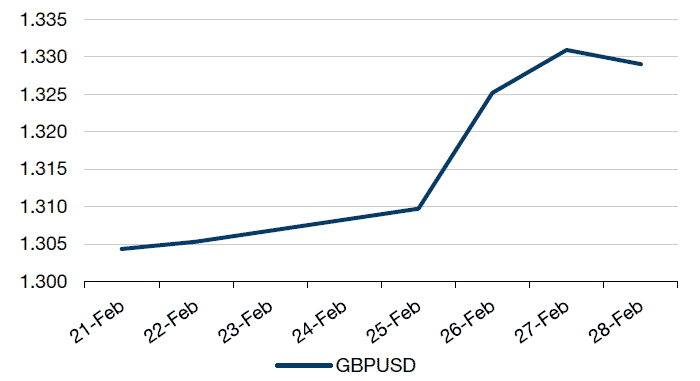
Source: Bloomberg, Time Period: 21 February 2019 - 28 February 2019.
Figure 5. GBPUSD Movements Over the Past Month
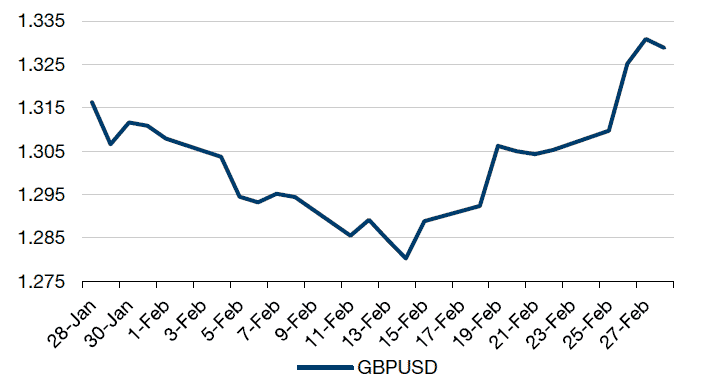
Source: Bloomberg, Time Period: 28 January 2019 - 28 February 2019.
Beyond Westminster:
- Aviva, UK’s second-largest insurer, announced it will move EUR9-billion of assets from the UK to Ireland in preparation for Brexit. The movement of assets was approved by the UK courts.
- The European Medicines Agency (‘EMA’), which has a 25-year lease in a London Canary Wharf building, argued that Brexit had “frustrated” the terms of its leave and they therefore did not have to pay an estimated GBP500-million bill. The Canary Wharf development took the EMA to the UK High Court to contest this and was successful, with the judge ruling that the lease “will not be frustrated on the withdrawal of the UK from the EU.”
- Retail organisations from both the UK and Ireland have warned of tariffs of 40% or more being imposed on food such as beef and cheddar cheese in the event of a no-deal Brexit.
You are now exiting our website
Please be aware that you are now exiting the Man Institute | Man Group website. Links to our social media pages are provided only as a reference and courtesy to our users. Man Institute | Man Group has no control over such pages, does not recommend or endorse any opinions or non-Man Institute | Man Group related information or content of such sites and makes no warranties as to their content. Man Institute | Man Group assumes no liability for non Man Institute | Man Group related information contained in social media pages. Please note that the social media sites may have different terms of use, privacy and/or security policy from Man Institute | Man Group.